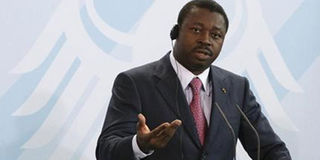Togo leader re-elected in disputed election

Togo leader Faure Gnassingbe. Photo/FILE
What you need to know:
- Gnassingbe wins by wide margin - provisional result
- Police tear-gassed protesters earlier; capital now quiet
- Main rival earlier claimed victory
LOME, Saturday
Togo’s President Faure Gnassingbe won re-election as leader of the West African state, preliminary results showed on Saturday, after a poll in which rivals raised suspicions of rigging.
The election was seen as a test for democracy in a region that in recent weeks has seen a coup in Niger and street riots over delayed elections in Ivory Coast. Togo’s last presidential poll triggered violence that killed hundreds.
Gnassingbe won 1.24 million votes, over half of the 2.1 million cast. His closest rival, Jean-Pierre Fabre, scored around 692,000 votes, according to results read by Taffa Tabiou, president of the electoral commission.
A statement on the Togolese government website put turnout at just under 65 percent. International observers said the poll had gone smoothly, despite some procedural flaws.
Hours before the result was announced, police fired tear gas to break up a protest by supporters of Fabre, who on Friday had already claimed victory. Ten people were arrested in the clash.
But eyewitnesses said Lome was otherwise calm, with a heavy police presence. The protests that followed Gnassingbe’s first victory in 2005 triggered a security crackdown in which up to 500 were killed, according to UN estimates at the time.
Gnassingbe took over from his late father Gnassingbe Eyadema, who ruled as a dictator for 38 years. Togo is one of the world’s top five producers of phosphates, which are used in fertilisers, but remains poor and dependent on foreign aid.
“Distress calls”
On Friday, Fabre said most Togolese were yearning for change. “I have heard the distress calls ... That is why I am warning all those who may be tempted to meddle with the vote of the Togolese,” he added. He said he reserved the right to appeal against the outcome.
Observers from the ECOWAS grouping of West African nations said the vote had passed smoothly but questioned how results would be collected after a malfunction in the satellite system intended to transmit data from voting stations.
In a statement on national radio, the ECOWAS mission raised concerns that the malfunction -- which meant local election officials had to travel to Lome with physical proof of vote tallies -- could undermine confidence in the result. A European Union observer team noted “procedural errors” but said they were not enough to raise doubts over the vote count.
More than 3,000 local and nearly 500 European and West African observers had monitored the election across Togo, a sliver of land between Ghana and Benin where half of the 6.6 million population were registered to vote.
Togo faced international criticism after the 2005 violence but a parliamentary election two years later was judged fair enough for foreign aid to be restored and ties pursued with bodies such as the International Monetary Fund.
Togo is near the bottom of the UN’s human development index and saw several years of negative growth in the past decade. The state budget for 2010 is around 500 CFA francs or $1.09 billion.




